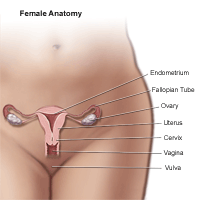Ectopic Pregnancy
What is ectopic pregnancy?
About 2 percent of all pregnancies develop outside the uterus and is called an ectopic pregnancy. These are nearly always in a fallopian tube. Rarely, an ectopic pregnancy will be located in an ovary or in the cervix, or even in the abdomen. Ectopic pregnancy is more common in women with the following conditions:
Infertility (difficulty conceiving)
Endometriosis--a condition in which the tissue normally inside the uterus grows in other areas of the pelvis.
Sexually transmitted diseases (these can cause infection and scarring in the pelvis)
Tubal surgery
Why is ectopic pregnancy a concern?
When the embryo implants in the fallopian tube, usually there is not enough blood flow to keep the embryo healthy and it dies.

The tube may begin to expel some of the tissues or bleed. Some embryos do continue to grow and may become large enough to break through the fallopian tube (rupture). This can cause severe bleeding, hemorrhage, and shock.
What are the symptoms of an ectopic pregnancy?
Women with an ectopic pregnancy may have irregular bleeding and often have pelvic or abdominal pain, especially one-sided pain. Tests to detect ectopic pregnancy include the level of a hormone in the blood called human chorionic gonadotropin (hCG). Ultrasound examination (a diagnostic imaging technique that uses high-frequency sound waves and a computer to create images of blood vessels, tissues, and organs) is used to determine if there is a fetus or other pregnancy tissues inside the uterus. In some cases, laparoscopy may also be used to diagnose and/or treat ectopic pregnancy. This is surgery that uses a lighted tube inserted into the mother's abdomen to examine inside her pelvis and often provides the most accurate diagnosis.
Treatment for ectopic pregnancy
Specific treatment for ectopic pregnancy will be determined by your doctor based on:
Your pregnancy, overall health, and medical history
Extent of the condition
Your tolerance for specific medications, procedures, or therapies
Expectations for the course of the condition
Your opinion or preference
Ectopic pregnancy may be treated in several ways depending on whether the fallopian tube has ruptured or not, the development level of the pregnancy, and the mother's hormone levels. Treatments may include:
Allowing the ectopic pregnancy to heal and be absorbed on its own (only for specific cases). Ectopic pregnancy should not be ignored. Always seek a doctor's care with any bleeding or pain in pregnancy.
Medication called methotrexate that stops the pregnancy from further development. Methotrexate is most successful when the ectopic pregnancy is diagnosed early.
Surgery (usually by laparoscopy). Salpingostomy is a surgical procedure to make a small opening in the fallopian tube and remove the pregnancy. If the tube is damaged, total or partial salpingectomy may be necessary--the removal of all or a part of the fallopian tube.
In rare cases, a laparotomy may be necessary. This is a surgical procedure in which an incision is made in the mother's abdomen to remove the ectopic pregnancy or damaged fallopian tube.